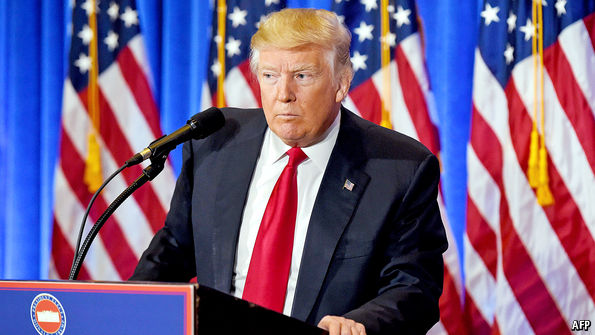Trump bashes the spooks
With his relentless criticism, Donald Trump is destroying trust in the intelligence agencies

DONALD TRUMP doesn’t give many press conferences. But when he does, as on January 11th—for the first time since July—they are utterly unlike the press conferences of any other American president-to-be. Speaking without notes, Mr Trump threatened and cajoled Mexico and the pharma industry (its shares tumbled). He boasted about his genius for business (and went some way to reduce his own conflicts of interest—see article). He poured scorn on a shocking report that Russian intelligence had dirt on him and had worked with his people during the election (he shouted down a reporter from the news channel that revealed the report’s existence). And that was just the highlights. It was such a spectacle (see article) and pointed in so many directions at once that you could fail to catch a drumbeat which, for the safety and security of the United States, Mr Trump needs to silence immediately: his continuing hostility towards America’s intelligence agencies.
Intel outside
Relations were already rocky. Before the election the agencies let it be known that they had concluded Russia hacked, stole and leaked documents which damaged Hillary Clinton, Mr Trump’s opponent. Most of the agencies (but not all) think that Russia’s intention was to help Mr Trump win. He responded by mocking them for being wrong before the invasion of Iraq in 2003 about weapons of mass destruction. This week things got uglier, when it was leaked that the agencies had supplied Mr Trump with a summary of the report, whose claims remain unverified, despite plenty of effort by plenty of people. In a tweet, Mr Trump complained that enduring such leaks was like “living in Nazi Germany”. And in his press conference he repeatedly suggested that the agencies had done the leaking, casting doubt on their conduct and loyalty.
Mr Trump would hardly be the first president to have scratchy relations with the intelligence services (see article). Career officers mutter about Barack Obama’s reluctance to stand up to China and Russia and what they saw as his soft line on spy-catching. However, Mr Trump’s disputes are in a different class, because they eat away at trust.
The agencies’ job is to tell the president about threats and opportunities facing the United States. Even though America’s intelligence machine is the world’s most formidable, it deals mostly in judgments and informed speculation, not certainties. In speaking truth to power, intelligence officers will sometimes have to bear bad news. They take that risk and the president listens to what they have to say because it makes the United States better prepared for whatever is coming its way.
By ridiculing the agencies for their findings, Mr Trump has signalled that he does not want to hear their bad news. By saying he cannot be bothered with the president’s daily briefing, he suggests their work is of little value. By claiming that the agencies have a political agenda, his people are themselves politicising intelligence work. By impugning their motives, he is undermining public confidence, which was already damaged by Edward Snowden (see article), and which, as with any institution, is essential if they are to go about their duties.
If he wants America to be safe, Mr Trump must make amends. He took a first step by criticising Russia for the Democratic hack (albeit reluctantly and mildly). Unlike his national security adviser, his nominees as directors of the CIA and of national intelligence enjoy support among spooks. In 90 days, he has said, they will produce a report on hacking: he should follow its advice. As president, he needs to stop criticising the agencies and demonstrate they have his backing. None of that is hard. Except that it is a test of Mr Trump’s self-control.

No comments:
Post a Comment